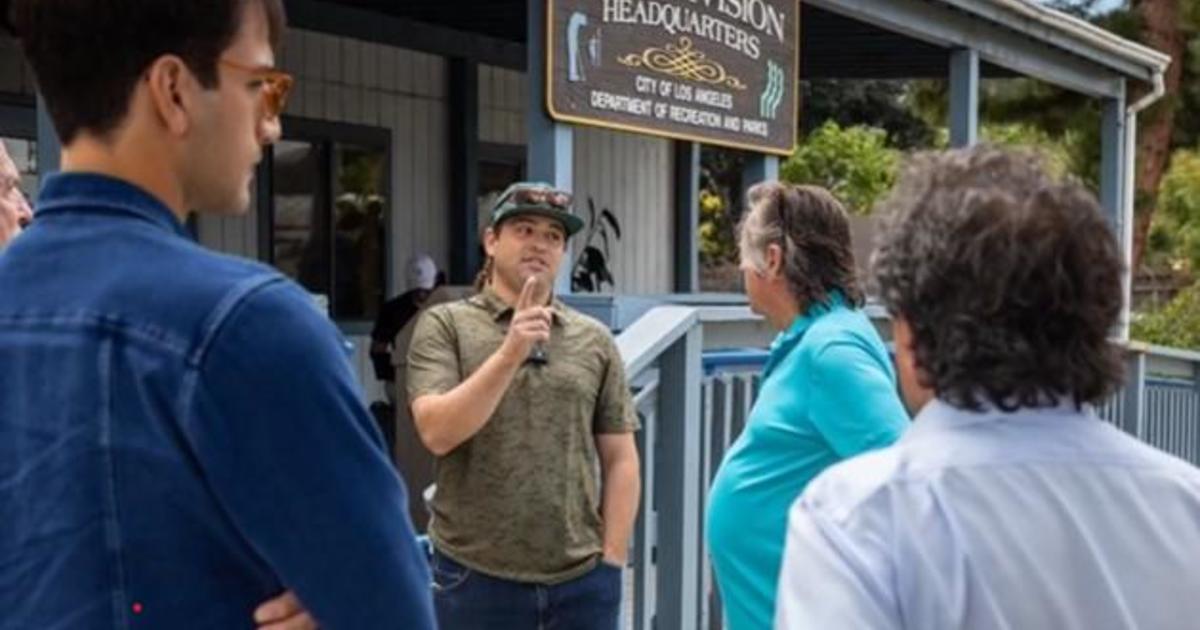Foodies Fight With Film School For Space In Hollywood
LOS ANGELES (AP) — For a few weeks this month, Los Angeles' arugula-munching set confronted a threat that seemed as potent as any malicious insect, pathogen or pesticide-tainted produce.
Where would they get their lovingly grown, locally sourced fruits, vegetables and artisanal edibles if a parking dispute with an adjacent film school forced the Hollywood Farmers Market to move or close?
The Los Angeles Film School, which has held classes in its nine-story Sunset Boulevard building since 1999, had refused to sign off on a permit for the Sunday farmers market because it blocks an entryway into a lot where the school's growing number of students park.
At the root of the conflict were some of the city's sacred mainstays: deep agricultural ties, the entertainment business and a lack of parking in a town dominated by cars.
Even as a temporary accord last week put the threat on hold, the foodie furor offered a peek at how dependent some have become on the Hollywood market, among the largest in the region, and the smaller markets it supports in low-income communities.
While consumer demand has encouraged farmers markets to sprout like Portobello mushrooms across the U.S., the attachment to just-picked produce and those who grow it appears particularly intense in Los Angeles, seated in a county that less than a century ago was the nation's leading agricultural producer.
"When you're talking about growers and shoppers being able to complete the exchange directly, it has a lot of resonance," cookbook author and food writer Amelia Saltsman said.
The Los Angeles Film School recently added computer animation and video game production to its curricula of film and recording arts, more than doubling the size of its student body from 750 to 1,700, spokesman Antoine Ibrahim said.
The growing population has increased demand for parking spots on Sundays, when throngs of students flood the school's labs and studios, Ibrahim said. The school also plans to begin holding classes on Sundays to relieve increasing weekday class sizes, he said.
Ibrahim insisted that the school never meant for the market to be shut down. It just wanted the vendors blocking the lot to be shifted to another part of the market.
"We've always worked with them to compromise and coexist," Ibrahim said. "We don't want them to move."
But the nonprofit Sustainable Economic Enterprises of Los Angeles, which organizes the market, said the configuration being pushed by the school meant it would lose half of its 100 farmers because there wouldn't be enough space for their stalls.
Shoppers say that would diminish their experience and make them less likely to schlep from far-flung neighborhoods to the produce bazaar that draws some 10,000 customers each weekend.
"It's really sad if they were to have to close or reduce the size," said Vanessa Lee, 27, who journeys from her east Los Angeles home at least once a month to buy apples, peaches or persimmons -- depending on the season -- from the market. "I couldn't imagine losing any of the vendors. They're all great."
Shrinking the market would also hurt SEE-LA's ability to subsidize markets that provide fruits and vegetables to as many 2,200 people each week in poor areas such as Watts and south Los Angeles, manager Alexandra Agajanian said.
"The success of the Hollywood Farmers Market has made it possible for us to do that," SEE-LA chief executive Pompea Smith said. "It really is a well-loved institution."
SEE-LA learned in early November that it was losing its permit because it lacked the school's endorsement, although extensions have kept the market open since then.
As word spread that the market's days were numbered, the dispute drew concern even among those who couldn't see the Hollywood sign.
TV and radio news outlets aired stories. The Los Angeles Times editorialized that "the market must be saved." City Councilman Eric Garcetti, whose district includes the market, received e-mails, calls and office visits from concerned shoppers and constituents.
Word came Thursday evening that a meeting between the market, the school and Garcetti's office had yielded an agreement that would keep the market open until April 12 while its organizers and the film school seek a permanent solution to the parking problem.
The school will look at building another way into the lot. SEE-LA, meanwhile, will hire a planner to see if there's a way to move the stalls to create access into the lot and still fit in all the farmers.
"I think this is a fair approach," Smith said. "As long as it doesn't decrease the connectivity among the blocks of the market and doesn't decrease the number of farmers and doesn't decrease the safety of the market customers, I think it will be fine."
(© Copyright 2010 The Associated Press. All Rights Reserved. This material may not be published, broadcast, rewritten or redistributed.)



